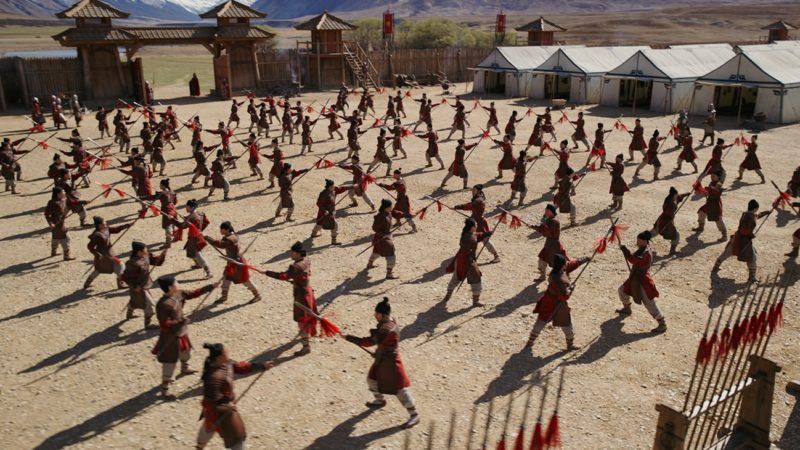(still from Mulan)
The new Mulan movie is facing a barrage of criticism—and promises to boycott—for filming near Chinese concentration camps and then thanking the Chinese Communist Party (CCP) for the privilege.
The film—a live-action version of the 1998 Disney cartoon by the same name—is based on Chinese folklore about a young woman (Hua Mulan) who pretends to be a boy so that she can fight in her father's place when he is conscripted into the Chinese army. In a sense, it's a tale about cleverness, bravery, and familial love helping to overcome hardships brought about by a violent and overbearing government.
That's makes Disney's filming location—Xinjiang—an extra slap in the face. Xinjiang is where China has been holding Uighurs in concentration camps and subjecting them and other Muslim minorities to horrible human rights abuses.
"The repression of ethnic Uighurs and Kazakhs in the western part of the country has been increasingly brutal and systematic," explained Daniel Drezner at Reason in April. "The erection of a massive network of internment facilities, prisons, and forced labor camps speaks to the regime's ruthlessness and deep illiberalism."
Which brings us back to Mulan. After the movie's Friday release "observers noted [that] in the final credits Disney offers 'special thanks' to eight government entities in Xinjiang, including the public security bureau in Turpan, a city in eastern Xinjiang where several re-education camps have been documented," notes The Guardian. In addition:
The film also expresses thanks to the "publicity department of CPC Xinjiang Uyghur Autonomy Region Committee", the Chinese Communist party's propaganda department in Xinjiang. Disney has been approached for comment. […]Activists calling for a boycott of the film are now highlighting its links to Xinjiang, while other researchers noted that the public security bureau in Turpan oversees at least 14 internment camps in the area.
"It's sufficiently astonishing that it bears repeating: Disney has thanked four propaganda departments and a public security bureau in Xinjiang, a region in northwest China that is the site of one of the world's worst human rights abuses happening today," writes Washington Post contributor .
"Disney has a long and ongoing relationship with China, where its films often find success in theaters and where its Shanghai Disneyland theme park resides," notes The Verge. And the company is expecting the new Mulan to do well in China where, unlike the U.S., it will actually be shown in theaters.
"Theatrically, Mulan has generated $6 million in limited markets—including Thailand, Malaysia, and Singapore—in its first weekend The film is slated to be released in China on September 11th," The Verge adds.
Disney decided to forgo a U.S. theatrical release and sell the movie directly to Disney+ app users for $30 (plus the price of a Disney+ subscription fee). "Whether or not pressure from protesters to boycott Mulan worked may remain unclear for a while," since "Disney doesn't have to disclose how many digital copies of Mulan it's sold via Disney Plus," The Verge notes.
Mulan's release has already been tied to a huge spike in Disney+ app downloads, suggesting political pressure may do little to dampen the film's U.S. popularity.

No comments:
Post a Comment